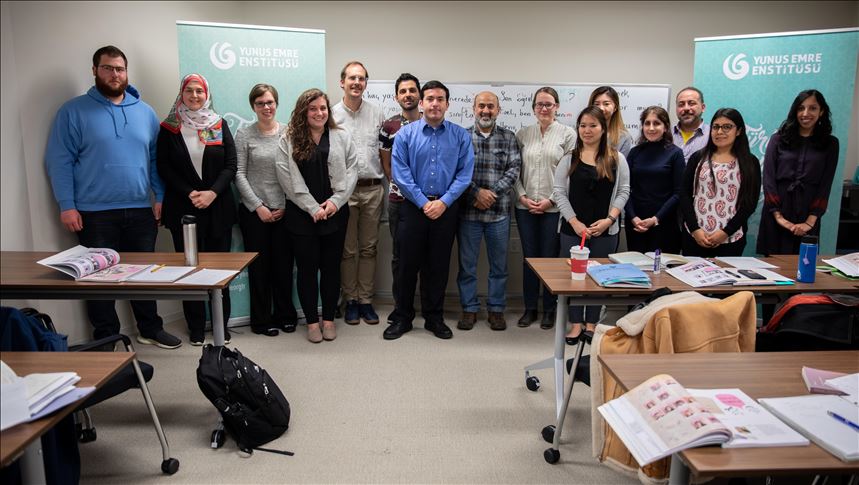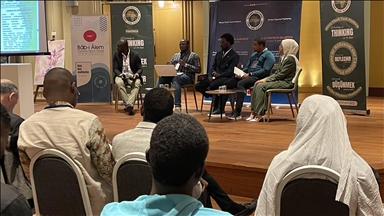 Students pose for a photo at Yunus Emre Institute, a non-profit aimed at promoting Turkish culture throughout the world, in Washington, United States on March 22, 2019. Eager students plan to travel to Turkey after studying in Washington to test out their language skills. Working professionals come in after a day's work, filtering into the room and taking their seats, eager to begin another evening of learning Turkish.(Yasin Öztürk - Anadolu Agency)
Students pose for a photo at Yunus Emre Institute, a non-profit aimed at promoting Turkish culture throughout the world, in Washington, United States on March 22, 2019. Eager students plan to travel to Turkey after studying in Washington to test out their language skills. Working professionals come in after a day's work, filtering into the room and taking their seats, eager to begin another evening of learning Turkish.(Yasin Öztürk - Anadolu Agency)
WASHINGTON
Working professionals come in after a day's work, filtering into the room and taking their seats, eager to begin another evening of learning Turkish.
Once they enter the classroom, the students leave English at the door as they embark on a journey of learning Turkish through being immersed in the language.
Huseyin Aydin, the instructor at the Yunus Emre Institute, a non-profit aimed at promoting Turkish culture throughout the world, makes it a point of emphasis to speak only Turkish in the class. And when an occasional English word is used by a student, Aydin acts as if the tongue is unknown to him.
"One thing that I appreciate about this course is that it's an immersion environment, which I think is rare for beginner level courses," said Bo Knutson, a student taking the first level course.
Language immersion is a tactic used in classrooms to simulate an environment where only the language being studied is spoken by the instructor and the student.
Knutson works at an international education organization which take U.S. students to different countries to learn languages, and foreign students to study in America. He currently works in a Turkish program, and it has created a fascination and desire to learn the Turkish language.
"I've been to Turkey multiple times," he told Anadolu Agency. "And I'd like to have deeper engagement with Turkey, Turkish citizens, that part of the world and explore on my own using my own language skills, not through a translator."
"One of my favorite parts about Turkish culture is Turkish coffee. And cuisine, the food, the people, the architecture, the history."
Knutson is taking the courses at Yunus Emre because he is planning a trip to Turkey, and wants to get his language skills up to par for when he visits.
"I'd like to be able to get up to a functional level where I can navigate the city, ask for directions, order a meal, communicate with people, and do basic things," he added.
Traveling to Turkey
Visiting Turkey is something many students have in mind, with the goal to culminate in the knowledge that they have learned and put it to the test.
Zaineb Alattar, a student originally from Iraq, wants to learn the language so she can better understand Turkish movies, but she is also planning a trip to Turkey in the fall, and wants to "be able to feel comfortable speaking while there."
"I've gotten to practice it a few times also around D.C. at some of the Turkish spots, like coffeeshops and restaurants," Alattar said.
Natalie Tan, a student who works at an international organization in Washington, will be going to Istanbul next month, and is studying Turkish to see if she can get a baseline knowledge of the language before she departs.
"Cay icelim," "merhaba," and "nasilsin" were some of the phrases that stuck out to Tan, which in English mean "Let's have tea," "Hello," and "How are you?"
Three months into her studies, Tan finds the language to be "extremely interesting so far."
"My goal was really to have an idea of how the language structure works," she said.
"I think you learn a lot about the society and what they consider important through the language. And this class has really helped me realize how methodical the language is, how very clear and easy it is to learn it. It's just that there is a lot to learn."
Learning the language
Turkish is a major member of the Turkic language family, and is spoken in not only Turkey, but also Cyprus, Greece, and other parts of Europe and the Middle East. It is one of the top 15 languages spoken worldwide.
The Yunus Emre Institute was created in 2007, named after a famous 14th century Turkish poet. The organization currently has more than 58 cultural centers worldwide.
"The Turkish classes have been going on for the past two years, and so far we've been instrumental in getting more than 200 people to engage in the Turkish language," said Halid Bulut, head of Yunus Emre's Washington branch.
"People from all ages and professions participate in our courses, and although these classes are considered to be simply a venue for language instruction, they offer opportunities to learn Turkish culture, traditions and values," he added.
Once the students began to learn the language, they realized that while it was a challenge, it was a fun and interesting experience.
"I enjoy vowel harmony in the Turkish language. I find it makes pronunciation smoother, pleasurable once you learn those rules," Knutson said. "And it's interesting, to me it seems a very flexible language and very expressive, so I value that."
"I've studied quite a few languages, but mostly in the Western European, either Romance languages or Germanic, and the grammar is fascinating. I love the structure of it all, and learning all the pronouns and suffixes and prefixes. It's fascinating to learn," said Isabon Thamm, a budget analyst at the Bureau of Labor Statistics.
Thamm is originally from Germany, where Turkish is also the second-most spoken language due to the large wave of immigration from Turkey to Germany since the 1960s. About 3 million people of Turkish origin currently live in Germany.
Alattar said she appreciated how the language incorporated words and phrases from other languages, such as Arabic and Farsi.
The class will run its course through the end of May, but it will only cover half of the textbook that is used for instruction.
"There's an opportunity for self-study I think after the class," said Knutson.
"So my goal is to keep working with the book even after the class and maybe take another class at Yunus Emre if there's an opportunity."
Anadolu Agency website contains only a portion of the news stories offered to subscribers in the AA News Broadcasting System (HAS), and in summarized form. Please contact us for subscription options.




